Speirs on election shambles: I was like a kid strapped in the back seat of the car and dad’s passed out
The state opposition leader has the hardest job in politics. After a humiliating defeat at the state election, the new Liberal leader knows radical change is needed to ensure his party can survive.
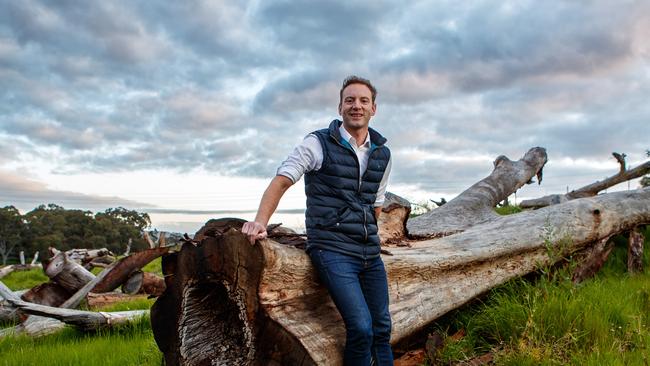
SA Weekend
Don't miss out on the headlines from SA Weekend. Followed categories will be added to My News.
The accent. That soft Scottish burr. It’s an unusual sound to hear coming out of the mouth of a leader of the South Australian Liberal Party. But David Speirs believes it is an advantage. That, at the very least, it marks him out as something different in the world of politics. It gives him that thing that politicians crave the most – recognition.
There’s also another benefit.
“The Scottish accent is supposed to be very trustworthy,’’ he says. “There’s been research into that. As a politician that is probably a good thing.’’
The 38-year-old Speirs was dragged unwillingly to South Australia by his parents 20 years ago from Galloway, a rural area in the deep south of Scotland.
Still, a migrant running one of the state’s two main political parties is not a new phenomenon, even in modern times. Long-serving Labor premier Mike Rann arrived in SA, via England and New Zealand, when he was 24. Another similarity between Rann and Speirs is that both were put in charge of piecing together parties that had been ripped apart by shocking election losses. What’s that about migrants doing the jobs that no one else wants to do?
But if Speirs was a reluctant migrant, that’s all changed now. He calls both South Australia and Scotland home. And won’t be changing the voice. Or, as he calls it, trying to “reinvent history’’ by toning down the accent.
“I open my mouth and I’m clearly from somewhere else,’’ he says, and finds another benefit. “Which, from a polling point of view, it means my name ID is very high because people know I am the Scottish bloke.”
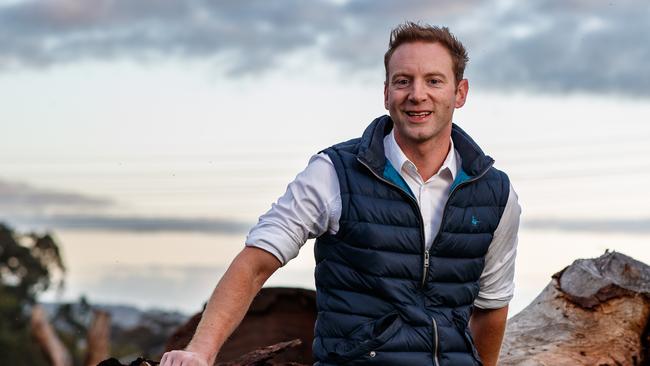
Speirs has been in the job almost a year now. It’s been a tough year. No one really cares what a losing opposition has to say in the aftermath of defeat, especially when the rout was as comprehensive as it was in March last year when Labor was restored to power. Which means Speirs has been a low-key presence so far.
There has been the occasional flare-up, usually belting the Malinauskas government on ambulance ramping, or enjoying its discomfort on its struggles to explain why it paid so much money to singer Sam Smith or royals Zara and Mike Tindall to visit SA.
But it means there have been criticisms, both internally and elsewhere, that Speirs hasn’t done enough to differentiate himself from the government. The Speirs defence is two-fold.
One is that with an election not due until 2026, there is no need to rush out policy, although he says it will come.
The second is that his first priority in the first year was to rebuild the internal structure of the Liberal Party so that it becomes a “modern’’ political outfit and evolve from its history as the party that always loses elections.
The still-new leader is withering in his assessment of his party’s performance at the last election. Speirs sees himself as a “straight shooter” and doesn’t hold back on Liberal failure.
When it’s put to him that the Liberal election campaign was one of the worst in living memory he counters with: “To run a bad campaign you’ve got to run a campaign.”
He goes on. “I described myself as being a kid strapped in the back seat of a car and dad’s passed out. But the car’s still moving forward and there’s a corner coming and a big drop. I can’t get out. The seatbelt’s on too tight. I was a cabinet minister, a reasonably influential one, and I couldn’t get my hands on that steering wheel.”
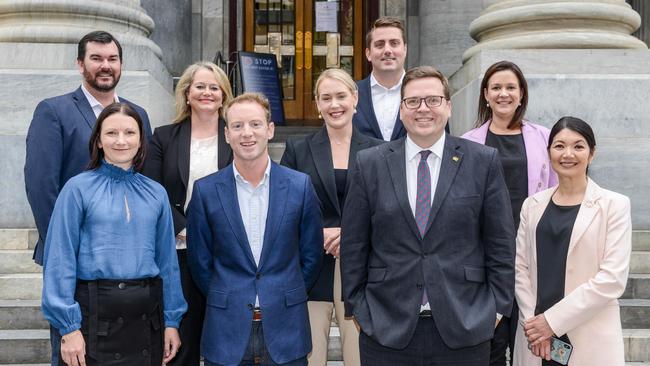
Speirs says when he took the reins in April, he received a congratulatory call from the new Premier who told him, “You’ll spend a lot of time managing the party.”
Malinauskas was right but it was a shock to Speirs who wasn’t a “creature of the party” and had never involved himself in the internal wranglings that often saw the Liberals spend more time arguing with itself than Labor.
Speirs says it’s been the hardest part of the job so far. But he also believes he’s making progress, saying he got his way on the choice of a new president and a factionally balanced executive.
“My first nine months was to stabilise, unify and modernise the back room,” he says. “The way we communicate, the way we brand things, not a new logo for the sake of a new logo, just a modern approach, and we’re well on our way with that stuff,” he says.
Part of it will also be defining the “values” of the Liberal Party. “Not weird values, not out there values, not extreme right values by any means, just what the Liberal Party is about, the party of small business, the party of the regions, the party of community values, family values,” he says. Speirs says these “values” will be released in the next two months.
A driving force for Speirs is to bring more Liberal women into parliament, particularly in the lower house. That the Liberals only have two women in the House of Assembly is a shameful statistic. Speirs points out that the seven seats the Liberals lost to Labor all went to women. He acknowledges that it will “inhibit” the party’s chances of winning in 2026 if more women are not chosen.
Yet, his levers are limited.
Speirs says he is prepared to support quotas, but many in the party won’t. He can’t direct pre-selections. All he can do is express a preference, as he did when he said a woman should replace the retiring Vickie Chapman. The party ignored him and chose a man. He also believes a woman should replace retiring veteran Stephen Wade and could again be rolled.
It runs the risk of making him look weak.
“The Liberal Party is difficult to manage from that perspective, so yeah, it might be a reflection on me,’’ he acknowledges. He tells me he is “choosing his words carefully’’ in our conversation but his sense of frustration is not far from the surface, no matter what he says about his success in modernising the party.
“I can’t run a dictatorship,’’ he says. “I just can’t run a dictatorship because then I really won’t be around for very long. So I’ve got to find ways to encourage the party to modernise along those lines.
“I’d like to see more women in every office in the party. It would be difficult to see too many more vacancies with men filling them. It’s accumulative and it sends the wrong message.
“I have to make it one of my mantras, one of my aims to get more women in lower house seats. I don’t see any option for me.”
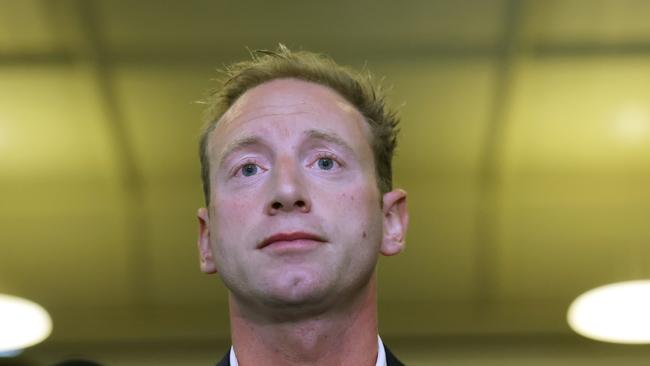
Speirs is trying to rebuild a party still carrying the scars of last year’s rout. By 2026, Labor will have been in power for 20 of the last 24 years. It’s not hard to see why Speirs believes the party needs to change. But despite that, Speirs believes Steven Marshall’s government will be well regarded by history.
Speirs was on the ABC’s election night panel watching the election results come in and was shocked by what was happening. Before election day, he thought it could be tight, with some marginal seats at risk. But he wasn’t prepared for the pasting that followed.
“If these results are replicated, I’m going to be looking for a job on Monday,” he was thinking to himself.
Fortunately for him, the swing against Speirs in his southern suburbs seat of Black was limited to 6.5 per cent, although still large enough for it now to be classed as marginal.
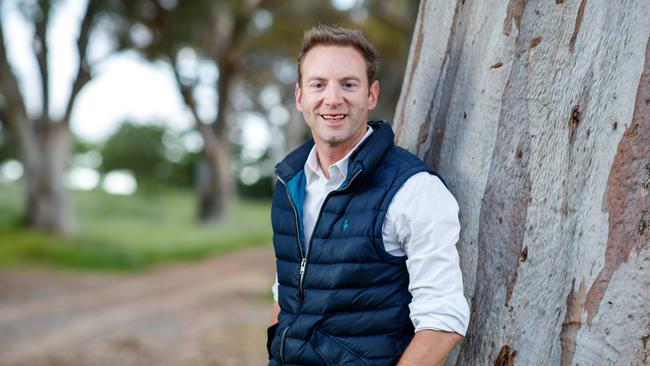
Walking around Glenthorne Park, the opening up of which Speirs regards as one of his most notable achievements as environment minister, in his trademark puffer vest, open-necked shirt and jeans, he talks about the history of the place, the horseshoes you can still find from when it was used by the cavalry for training in World War I, the chalk marks made by settler Thomas O’Halloran to record his grape harvest.
Despite his contention that it was a good government, Speirs concedes there was a “laundry list” of issues that derailed the Liberal time in office. The drama of the Country Members’ Allowance where various MPs paid back money wrongly claimed under the scheme. Deputy Premier Vickie Chapman’s battles against conflict of interest allegations over a development on Kangaroo Island, even though she was later cleared by the Ombudsman. Changes to bus timetables. Fights with the business community.
It was a government that lost its comfortable majority and slid into a chaotic minority government in short order.
“I think there was a view that there was a bit of messiness with our government,” he says.
Of course, there was Covid as well.
There is no doubt Steven Marshall, alongside chief public health officer Nicola Spurrier and Police Commissioner Grant Stevens, did a sterling job in guiding the state through the pandemic. SA experienced shorter lockdowns, far fewer deaths and better economic outcomes than just about anywhere else. Speirs believes the former government didn’t do enough to “champion” its Covid-19 management, but also concedes that the onset of the Omicron variant which hit just after the state reopened in November 2021 complicated matters.
But he points to what happened in the nation he left as a point of comparison. “My hometown in Scotland, Christmas 2020, just a couple of super spreader events. No one’s got grandparents left,” he says. In one nursing home alone, there were 70 fatalities.
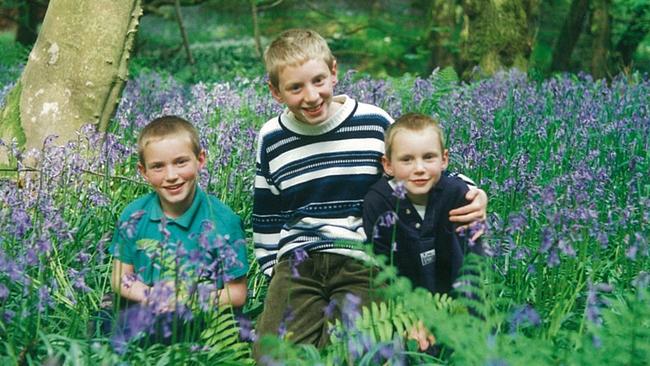
Speirs’ home town is called Kirkcolm, a small village on the remote southwest corner of Scotland. It’s so out of the way it’s quicker to travel to Belfast in Northern Ireland than to the Scottish capital Edinburgh. In his 17 years in Scotland, Speirs says he only made it to Edinburgh, a meagre 220km away, three times.
“I describe it as sort of Ceduna in terms of relative isolation,” he says of Kirkcolm.
Speirs’ mother is from the north of Ireland, her family moving from its small dairy farm to Scotland, to escape “the Troubles”, the civil war that marked that island for decades.
Spiers’ grandfather was worried he could lose a child to the violence and took the family to Scotland in 1979.
Speirs describes his upbringing as “intensely rural”. His grandparents ran a dairy farm where he was a regular presence, his father was a builder. There were only four kids in his class at primary school. For high school he went to Stranraer Academy, about 20km from home.
Spiers says he didn’t grow up in a political household. He doesn’t think his mum and dad were regular voters, although Galloway is one of the few regions in Scotland to vote Conservative. His earliest political memory was as a five year old sitting on a couch with his grandfather.
“I remember very clearly, he said, ‘It’s a bad day for the country, David, because Margaret Thatcher has left Downing Street,’’’ he says.
It wasn’t until he was older at Stranraer Academy that he started to pay more attention to politics. In his maiden speech after his 2014 election win he said of his schooling: “It was a forlorn place which I was never really fond of, but where I made friends for life and where my interest in politics was sparked and nurtured by Mrs Dutton, a passionate socialist who made politics interesting and brought it all to life for me.”
Speirs’ English teacher at Stranraer Academy, Lyndsay Gibb, remembers a “studious” pupil who was active in school life. He was on the student council and editor of the class of 2002 year book.
“His role in this, aside from checking articles and providing his own perspective on his time as a student in the school, was to ensure solid finance – convincing teachers and those in the community to part with their cash to ‘sponsor’ various aspects of the year book required all his persuasive skills, and he succeeded with aplomb,” she remembers. Gibb says the sponsorship helped lower the cost of the year book, which allowed many students to buy the book who might not otherwise have been able to afford it.
“This was an early sign of David’s Liberal tendencies as he sought to support those less well-off than himself,” she says.
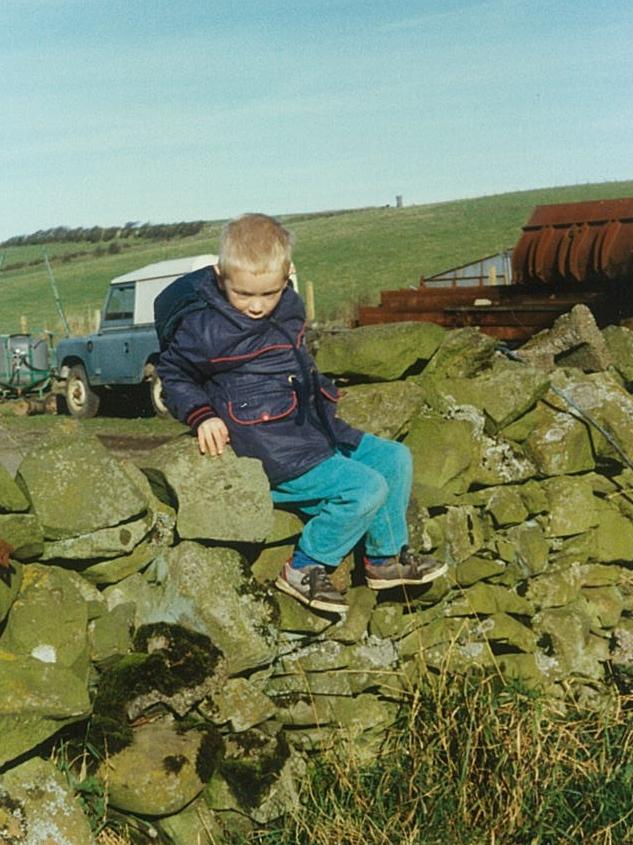
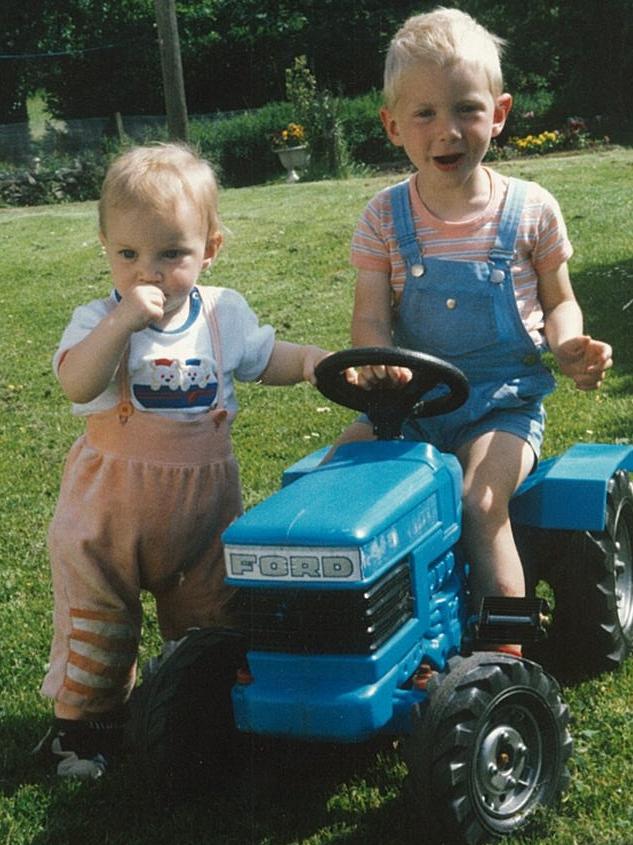
Speirs had finished his last year of school when his mum and dad decided it was time to fulfil a long-held dream and move to Australia. His father had lived in Australia previously, but had returned to Scotland to look after his sick mother. The junior Speirs had only been to Australia once before. That was a driving holiday across the continent in a camper van, with his parents and two younger brothers when he was 13. His memories of the stop in South Australia are “probably more based on photographs than anything else”.
It was after his grandmother, who had multiple sclerosis, died in 2001 that his parents decided to make the leap. Their son was “very unhappy”. He was at the age where he could have stayed in Scotland, but decided to give Australia a go. Adelaide was chosen because the immigration system made it easier to move to South Australia than Sydney or Melbourne. The initial idea was to use Adelaide as the launching pad to the rest of Australia, but 20 years later Speirs’ parents are still in the same Hallett Cove house they bought after migrating.
If he had stayed in Scotland, Speirs is not sure what he would have done. He expects he would have headed to university, but probably wouldn’t have studied law as he did at Adelaide University. He might have become a vet or done something in environmental studies.
It was a return trip to Scotland eight months after the big move that persuaded Speirs his future was in Australia. “I thought it’s not as good as I had pretended it was in my mind,” he says. As he tells it, that trip home was the spur he needed to throw himself into a new life in Australia. He joined the Brighton Surf Club and joined local environmental pressure groups.
Eventually he would win a spot as a Marion councillor and took a job as a public servant working within the premier’s department when Mike Rann was premier.
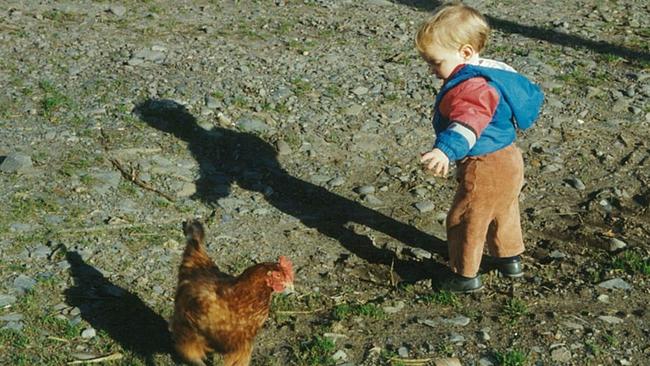
Speirs was not yet 30 when elected at the 2014 election. He entered a parliamentary Liberal party shattered by yet another election loss. This one may have been even more painful as many had predicted the Liberals would win.
But Speirs made a name for himself early with some colourful speeches. In one he called political advisers “underqualified and overly confident, largely aged between 25 to 35 and characterised by having log-in details of multiple fake Twitter accounts”.
He was elevated to the Liberal frontbench in 2017 as environment spokesman but was almost immediately embroiled in controversy after it emerged his former electorate office manager Helen Dwyer had been awarded $50,000 by the Industrial Relations Commission following a bullying and harassment claim. At the time, Speirs said the allegations were “untrue” and Dwyer was prevented from speaking because of a confidentiality clause in the settlement. Now, Speirs says he was unaware of what it was all about. “No accusations were ever put to me,” he says. He believes there may have been an issue between Helen Dwyer and another staff member.
“There was a lot of friction in the office between a younger female and her and maybe I didn’t manage it well at the time. But it is what it is, it was a long time ago,” he says.
Speirs refutes allegations put by the Labor Party that he has either a temper or a glass jaw. Still, there are others within his party who say he’s not good at dealing with criticism.
Speirs also recently filed an unsuccessful complaint against The Advertiser with the Australian Press Council, unhappy with coverage of his property holdings.
“You would be hard pressed to find examples of my temper having either held me back personally or negatively impacted those around me,” he says.
“There were some ministers of the Labor Party who are famous for getting their iPhones replaced because they have thrown them at people or at walls. There’s no examples of that in my world.”
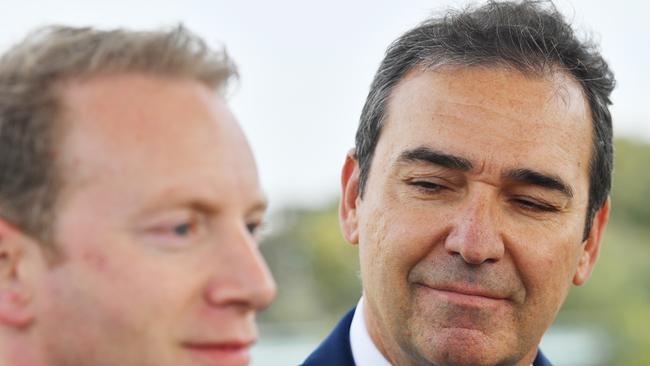
Former premier Steven Marshall stood by Speirs when the news broke about the $50,000 payout and calls him a “highly capable person, who comes from a very non-traditional route into politics”.
“He’s got a huge intellect and is also very practical as well,” Marshall says.
Marshall also stood by Speirs in his early days as environment minister when he was lambasted by Murray-Darling Basin Royal Commissioner Bret Walker for signing up to a water deal he labelled as “contrary to the interests of South Australians”.
“It is nothing short of a capitulation to the interests of the current Commonwealth Government, and those of Victoria and New South Wales,” Walker said.
Marshall says Speirs was “under enormous pressure” at the time but was backed by the entire cabinet. “I think it was a test, but I think it was a test he came through with flying colours,” says the former premier who had little time for the commissioner’s findings.
If Marshall had held on as premier, Speirs was most likely to have been named treasurer to replace departing Rob Lucas. “That was my hope, and it wasn’t an unrealistic hope,” Speirs says.
He says becoming leader wasn’t on his radar even though he unsuccessfully stood for the role of deputy premier when Vickie Chapman resigned before the election.
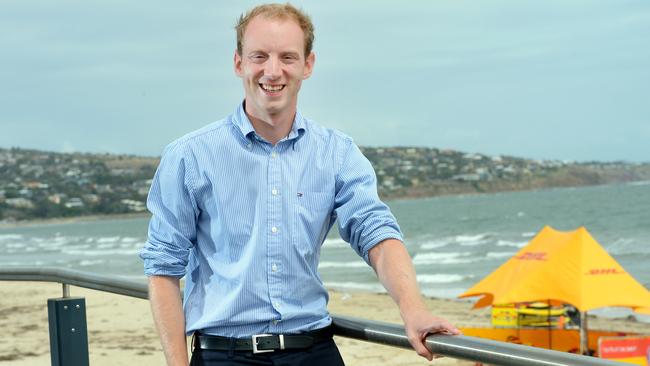
The once-married Speirs is a mix of socially conservative views – he voted against abortion and euthanasia reforms – and environmentalism, and describes himself as a conservative in the mould of former NSW premier Mike Baird or ex-British prime minister David Cameron. “I’m not going to die on ideological mountains,” he says.
He also says he is not a religious “warrior”, although he was caught up in a recruitment drive for the Liberal Party in Pentecostal churches, spearheaded by Liberal Senator Alex Antic. Speirs made a speech where he said to “forget about” the separation of church and state. Now he walks back a little from those sentiments. He calls it an “interesting time” and says he was “sucked into that vortex a little bit”.
Speirs says he was trying to make the broader point that religious people should feel comfortable entering politics. That they shouldn’t have to leave their values at the door.
He says the recruitment drive resulted in a lot of “good people” joining the party and would not result in the party lurching to the right.
“I don’t suspect crazy motions from the floor of our state council demanding X, Y and Z and a move towards a state-based church,” he says.
Speirs now has a bit over three years before the next election. Obviously, he thinks there is a way for the Liberal party to win. A way to claw back that yawning deficit.
“I do think that Labor’s got very high expectations. We probably hit low expectations. Labor won’t meet their expectations, we will exceed ours. We end up being a bit closer together and I just think Peter Malinauskas is manufactured and fake.”
And if all else fails, there is the Scottish thing.
“People are like, ‘He’s a bit of a straight shooter, he’s Scottish, energetic and a bit different.’” ■


